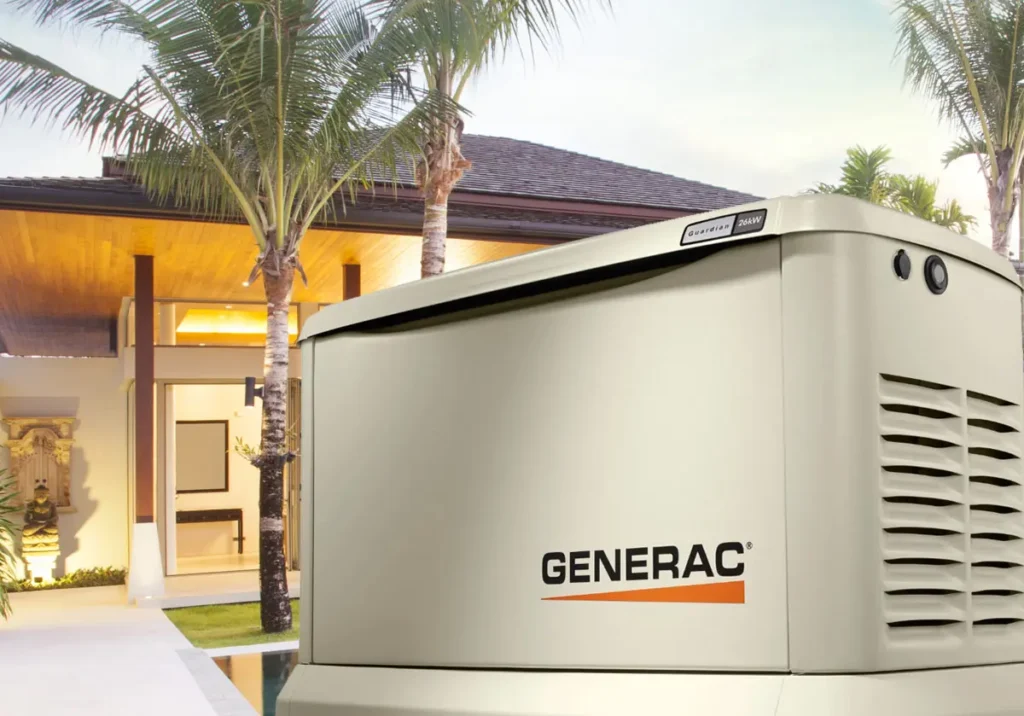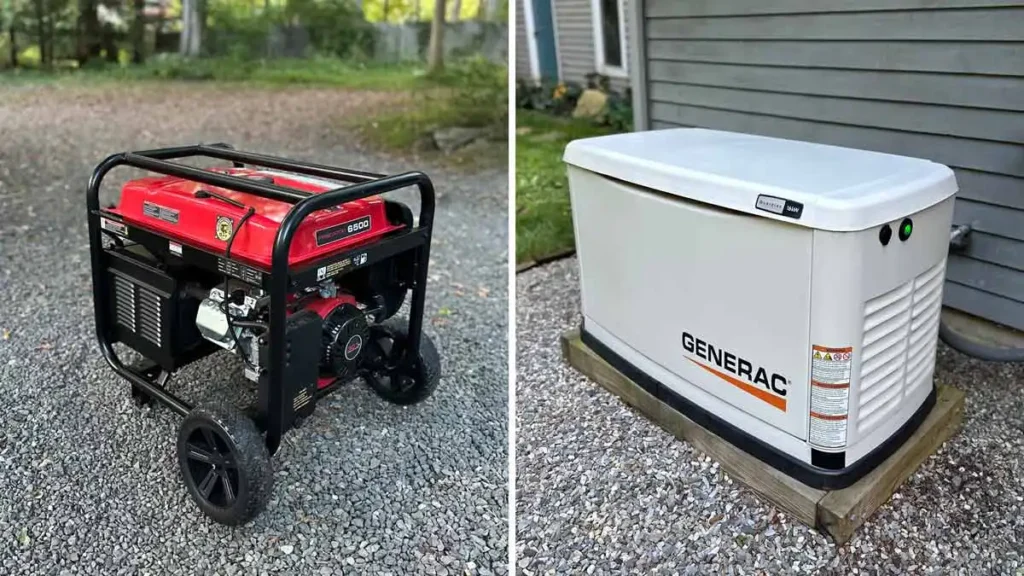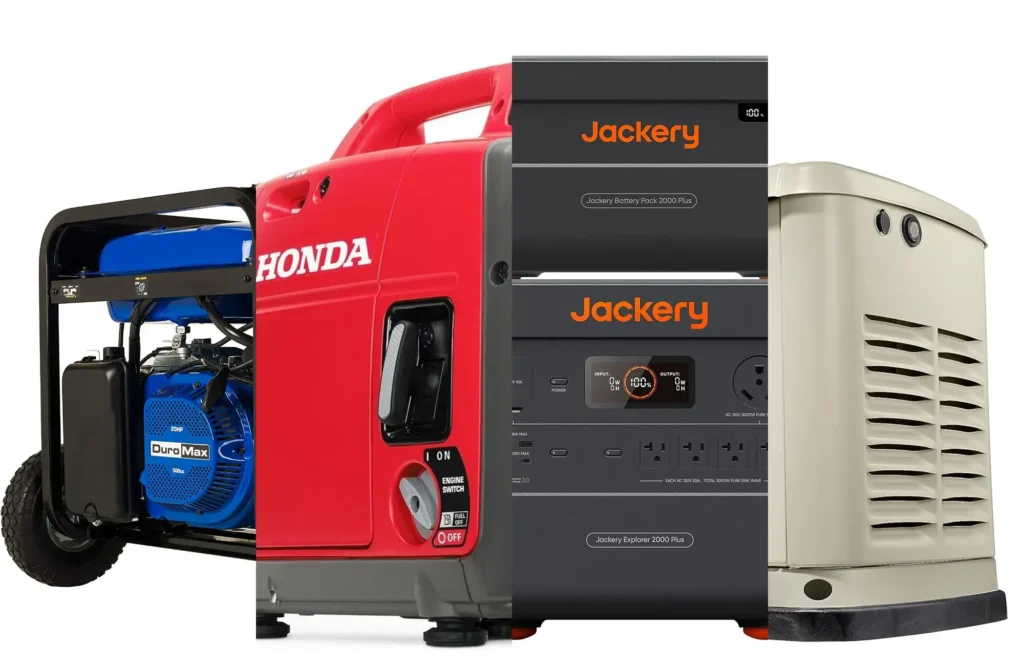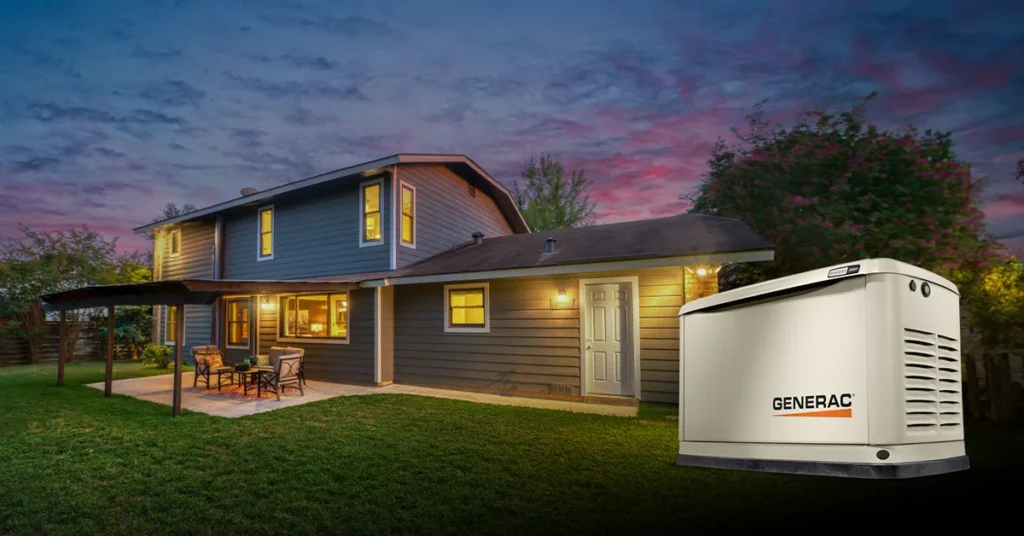A whole-house generator is a permanently installed system that powers your home when the grid fails. It connects to your electrical panel through an automatic transfer switch and runs on natural gas or propane.
Homeowners who ask what a whole-house generator is want a reliable backup that keeps HVAC systems, sump pumps, and essential appliances running during an outage.
It provides instant power, safeguards your property, and gives peace of mind during storms or emergencies.
If you’ve ever wondered if it’s worth getting a whole-house generator, the answer depends on your needs, location, and power demands. For most New Jersey homeowners, the long-term security and comfort it provides make it a smart investment.
Power outages can happen anytime. When they do, homes lose light, heating, air conditioning, or even vital medical equipment. Grounded Electric helps homeowners across New Jersey stay ready with trusted generator installation services.
Led by Robert “Bobby” Mulholland and project manager Barret Abramow, the company installs safe, high-quality systems built to last.
Key Takeaways
- A whole-house generator keeps essential appliances, HVAC systems, and sump pumps running automatically during power outages.
- Choosing the right model depends on your home’s size, energy use, and preferred fuel source.
- Installation costs vary by home size and generator capacity, so professional help ensures safety and compliance.
- Standby generators add long-term value, protect comfort, and support families using medical equipment or other critical devices.
- Regular service keeps your generator reliable, safe, and ready for emergencies.
What a Whole House Generator Does
A whole-house generator starts automatically when power goes out. The automatic transfer switch detects the outage and restores electricity in seconds. This keeps your key systems – like heating, cooling, and lighting – running without effort.
Unlike a 4000-watt portable generator, which powers only a few essential appliances, a whole-house system handles your entire electrical load. It keeps your home running smoothly even during long outages. To learn more about system types and features, visit our generator guide.
What Is a Generac Whole House Generator
Generac is one of the best-rated 4000-watt generator brands. It’s known for durability and reliable performance. These models are also among the quietest 4000-watt generator options, making them perfect for residential neighborhoods.
Generac’s permanently installed units deliver consistent power and help protect your home during blackouts.

What Powers and Runs a Whole House Generator
Whole-house generators usually run on natural gas or propane. These fuels burn cleanly and can power your home for days. The generator connects to a gas line or propane tank and starts automatically when needed.
Systems must follow local electrical codes and be properly vented to prevent carbon monoxide buildup.
Whole House vs Portable Generator
Portable units, such as a 4000-watt portable generator, can power small devices like a refrigerator or space heater. They must be started and refueled by hand. Whole-house generators are permanently installed and automatically switch on.
Bobby Mulholland often recommends standby systems for families who want dependable, long-lasting power.
They prevent food spoilage and keep heating or cooling running safely. Learn more about how long to run a generator for a refrigerator to keep food safe during extended outages.

Comparison Snapshot: Portable vs Whole House Generators
Portable Generators
- Lower cost
- Manual startup and refueling
- Works for short outages
Whole House Generators
- Starts automatically
- Powerful home systems
- Best for long or frequent outages
Choosing the Right Generator
Choosing a generator depends on your home’s size, power use, and local weather. For help comparing fuel types, capacities, and wattages, check our guide to choosing a generator for your home.
Smaller homes may use a 4000-watt inverter generator, while larger ones need higher-capacity systems. A professional installer can help balance performance, cost, and efficiency for your key household systems.
What Size Is a Whole House Generator
Most homes need between 14,000 and 24,000 watts to power major systems. The best 4000-watt generator is suitable only for small circuits. Proper sizing avoids overloads and keeps sump pumps and HVAC units working safely.
Top Whole House Generator Brands
Generac, Kohler, Honda, and Briggs & Stratton are leading names for whole-house generators. These brands are reliable, quiet, and backed by strong warranties. A quietest 4000-watt generator suits smaller setups, while large models power full homes.

Key Features and Model Comparisons
When choosing a generator, look for a transfer switch, remote monitoring, and durable housing.
These features make operation easy, protect against the weather, and ensure long service life. Noise level, power output, and warranty length are also important for comfort and value.
Top reliable models include:
- Generac Guardian 22kW – Automatic start and mobile monitoring.
- Kohler 20RESCL 20kW – Quiet and weather-resistant.
- Champion 14kW Standby – Affordable option for smaller homes.
- Westinghouse WGen9500DF – A strong 4000-watt portable generator for limited use.
For most New Jersey homes, Grounded Electric recommends Generac or Kohler for dependable, long-term power protection.
Costs and Installation Factors
Installation costs depend on the generator’s size, brand, and local codes. Most homeowners spend between $7,000 and $12,000 for a complete system.
Grounded Electric manages all parts of the generator installation, including inspection and testing.
Bobby Mulholland ensures every setup meets electrical and gas safety standards. Homeowners should plan for site prep, gas line setup, and electrical upgrades.
Average Cost Guide by Generator Size
Sources
Disclosures
The installed cost ranges shown are approximate because public sources provide broad ranges that vary by region, labor, permits, site conditions, and options. Size-to-home-type mappings and coverage labels reflect typical guidance from Consumer Reports and manufacturer materials; individual homes may require different capacities.
These ranges help homeowners estimate cost based on home size and power needs.
Fuel Efficiency and Operating Cost
Fuel efficiency affects how much it costs to run your generator. Natural gas and propane models are cheaper and cleaner than diesel options.
A natural gas generator can run continuously when connected to a gas line, while propane units are ideal for homes without natural gas service.
On average, a 14–20 kW natural gas generator costs about $1–$2.50 per hour to operate, while propane systems cost slightly more. Choosing the right fuel source helps reduce long-term costs and ensures reliable performance during outages.
Factors That Affect Pricing and Maintenance
Location, permits, and load capacity all impact price. Systems that power HVAC systems and primary electrical loads cost more but deliver greater comfort. Routine oil changes and filter checks keep the unit reliable for years.
Is a Standby Generator Worth It?
For many homeowners, standby generators are worth the investment. They start automatically, need little attention, and keep the home safe during blackouts.
Is a Backup Generator Worth It for Your Area
If you live in an area with frequent power outages, a standby generator can be essential. It keeps medical equipment, sump pumps, and refrigeration working. In storm-prone regions, it prevents costly water or food damage.
Is a Home Generator Worth It Long-Term
A home generator adds lasting value to your home. It keeps lights, heating, and security systems running during storms. Many Grounded Electric customers say that having dependable power keeps their homes safe and comfortable.
Long-Term Reliability and Peace of Mind
A well-maintained generator can last 15 to 20 years. Weekly test cycles keep it ready to run at any time. This gives homeowners steady protection whenever outages strike.
Main Benefits and Advantages
- Power for key household systems, such as HVAC, lighting, and refrigeration.
- Automatic operation during power outages.
- There is less risk of damage to critical home devices.
- Better comfort and property value.
Disadvantages and Maintenance Considerations
- Higher upfront and installation costs.
- Requires safe fuel storage and regular upkeep.
- Some models produce noise, though the quietest 4000-watt generator options help reduce it.
- Improper ventilation can cause carbon monoxide buildup.
How Long Can a Whole House Generator Run Continuously
A whole-house generator can run for 24 hours to several days, depending on the fuel source and tank size.
Natural gas generators can run indefinitely since they use a continuous gas line, while propane generators rely on tank capacity – a 500-gallon tank usually lasts about 7 to 10 days.
To stay safe, check oil, filters, and temperature during long use. With regular maintenance and steady fuel, your generator can keep all essential systems running through extended power outages.
Professional Setup and Local Code Compliance
Permits, inspections, and grounding are required for safety. Proper wiring and venting prevent fires and gas leaks.
Operation Safety During Power Outages
Never use portable generators indoors or near windows. Adequate ventilation prevents carbon monoxide poisoning. Standby systems are safer since they are permanently installed outside and start automatically.
Routine Inspection and Service Frequency
Regular inspections catch wear and corrosion early. Annual service keeps generators running efficiently and extends lifespan. Oil changes and diagnostic checks help ensure performance.
Regular inspections catch wear and corrosion early. Annual service keeps generators running efficiently and extends their lifespan. Oil changes and diagnostic checks help ensure top performance.
For expert maintenance and dependable care, schedule a consultation with Grounded Electric. Their licensed team can install, inspect, service, and keep your generator ready for any power outage.
FAQ About Whole House Generators
Can a Generator Power HVAC and Appliances?
Yes. Whole-house generators can power HVAC systems, refrigerators, and other essential appliances if sized correctly.
How Often Should I Test or Service It?
Most models perform weekly self-tests. Professional maintenance once a year keeps the system ready when needed.
How Much Maintenance Does a Whole House Generator Need?
Oil changes, air filter replacements, and basic inspections twice a year are usually enough.
What’s the Typical Lifespan of a Generator?
A quality generator can last up to 20 years with proper service, offering reliable protection and comfort.



